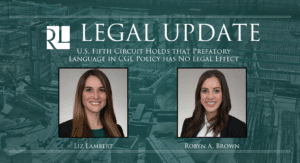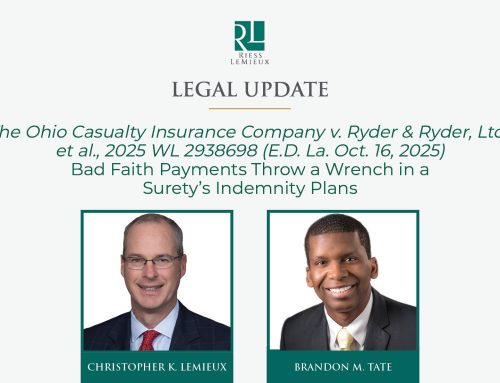
Allied World National Assurance Company v. Old Republic General Insurance Corporation; Oscar Renda Contracting, Incorporated
U.S. Fifth Circuit Holds that Prefatory Language in CGL Policy Has No Legal Effect
By: Liz Lambert and Robyn Brown
In Allied World National Assurance Company v Old Republic General Insurance Corporation; Oscar Renda Contracting, Incorporated, the Fifth Circuit applied ordinary rules of contract interpretation and found that prefatory language in a commercial general liability policy (“CGL”) endorsement had no legal effect; thus, the insurer had a duty to defend.
In Allied World, Regional Water District (“Water District”) hired IPL contractors to work on an integrated pipeline (the “Project”). IPL then hired Oscar Renda Contracting to perform excavation and pipelaying projects on a Project.
Old Republic General Insurance Corporation (“Old Republic”) issued a CGL policy to Water District that covered enrolled contractors, including Oscar Renda, on the Project. Allied World National Assurance Company (“Allied World”) issued an excess liability policy to the Water District.
Nabor Machuca-Mercado, who was employed by Oscar Renda, worked on the project as a laborer. While working on the project Machuca- Mercado suffocated to death as a result of being buried up to his head in pea gravel. Machua- Mercado’s family brought a wrongful death suit against Oscar Renda. Oscar Renda tendered its suit to Old Republic; Old Republic denied coverage under the CGL policy based on an exclusion in the CGL’s policy employer liability exclusion. As a result, Allied World brought a declaratory judgment against Old Republic.
The district court granted partial summary judgment in favor of Old Republic holding that the CGL policy excluded coverage. The Fifth Circuit interpreted the CGL differently than the district court and reversed the decision. However, the Fifth Circuit went further and stated that reversal was warranted even under the district court’s interpretation of the policy.
The Fifth Circuit contemplated two provisions in the CGL: the Exclusion and Endorsement. The Exclusion provision of the CGL excluded bodily injuries to an employee of the insured arising out of and in the course of employment by the insured; or performing duties related to the conduct of the insured’s business.
The Endorsement provision which modified the Exclusion was titled, “Fellow Employee Wrap-Up Exclusion deleted”, and reads as follows:
“With respect to Supervisory personnel, SECTION 1 – COVERAGES, COVERAGE A BODILY INJURY AND PROPERTY DAMAGE LIABILITY, 2. Exclusions, e. Employer’s Liability is amended to included:
This paragraph e does not apply to “bodily injury” to an “employee” when such “bodily injury” is caused by another “employee”.
It was not disputed that the indented line of the Endorsement created a carve out of the Exclusion by excluding employee injuries caused by other employees (the “Carveout Sentence”). Nor was it disputed that the Endorsement contained a prefatory phrase, namely, “With respect to Supervisory Personnel” (the “Prefatory Phrase”).
Under the Fifth Circuit’s reading of the policy, the Prefatory Phrase had no effect on the Endorsement because the Endorsement amended the Exclusion by adding the indented text only. Moreover, the Prefatory Phrase was located at the beginning of an un-indented line that ended by stating the Exclusion “is amended to include” followed by a colon and then the indented Carveout Sentence. Therefore, only indented language after the colon was to be added to the policy.
Accordingly, under the Fifth’s Circuit reading under the CGL policy, the CGL applied to the underlying allegations as they clearly involved a bodily injury to an employee caused by another employee.
The Fifth Circuit held that reversal was warranted on this alone, but also went further and found that even under District Court’s reading of the policy, the CGL provided coverage. The district court and the parties read the Prefatory Phrase into effect.
Specifically, under Allied’s reading, the Prefatory Phrase limited the Carveout Sentence to underlying suits which alleged that the conduct of supervisory personnel contributed to the employee’s injury. The Fifth Circuit held that this interpretation would still warrant a reversal because it was 1) reasonable; 2) did not create surplusage; and (3) any ambiguity must be construed in favor of coverage. Thus, the Fifth Circuit reversed the district court’s ruling and held that under either interpretation the CGL provided coverage and Old Republic had a duty to defend.



